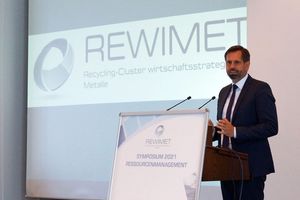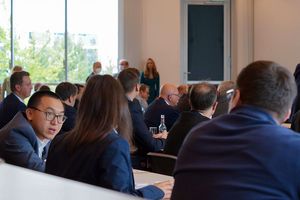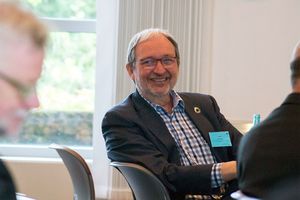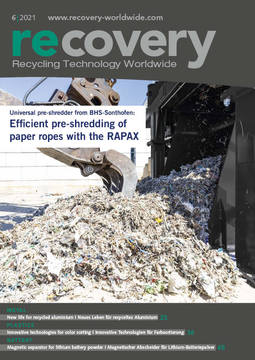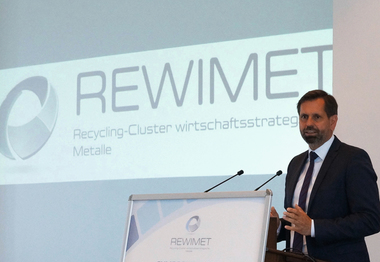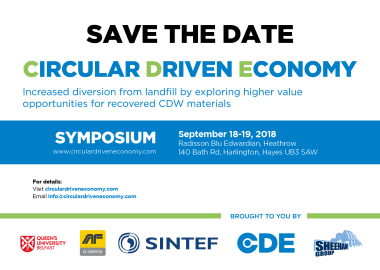REWIMET Symposium 2021 on the subject of Resources Management
REWIMET, the „Recycling Cluster of Economically Strategic Metals“, invited participation at the REWIMET Symposium 2021 on „Resources Management“ on 25 to 26 August 2021. Something unusual in the present situation: the symposium had been planned as an in-person event and was, indeed – with the application of ultra-strict rules of hygiene – able to take place as an in-person event. More than one hundred attendees travelled to the highly interesting two-day symposium held in Clausthal-Zellerfeld. A special highlight of the event was the tenth anniversary of the founding of REWIMET e.V., which in the evening was appropriately celebrated in the historic „Glück Auf“ hall with, inter alia, a commemorative address by Prof. Joachim Schachtner, President of Clausthal University of Technology.
REWIMET, the „Recycling Cluster of Economically Strategic Metals“, invited participation at the REWIMET Symposium 2021 on „Resources Management“ on 25 to 26 August 2021. Something unusual in the present situation: the symposium had been planned as an in-person event and was, indeed – with the application of ultra-strict rules of hygiene – able to take place as an in-person event. More than one hundred attendees travelled to the highly interesting two-day symposium held in Clausthal-Zellerfeld. A special highlight of the event was the tenth anniversary of the founding of REWIMET e.V., which in the evening was appropriately celebrated in the historic „Glück Auf“ hall with, inter alia, a commemorative address by Prof. Joachim Schachtner, President of Clausthal University of Technology.
The REWIMET e.V. network of companies, institutions conducting scientific work and local and regional authorities has existed since 2011. It promotes science and research for the development of new recycling strategies and processes for industrial applications. The association supports the aims of the EU‘s Green Deal and the German Federal Government‘s 2020 resources strategy for climate and environmental protection. The encouragement of young people and interdisciplinary cooperation are indispensable as supporting activities. The member organisations employ around 46 000 people and earn a total annual turnover of approx. 9.5 billion €.
The event was opened by Dr. Ulrich Kammer and Dr. Dirk Schöps, of REWIMET, following a speech of welcome by Olaf Lies, the Minister for the Environment, Energy, Construction and Climate Protection of the German state of Lower Saxony. Lies described the setting-up of the „circular economy“ as the greatest challenge of this decade. As he noted, the „throw-away mentality“ has grown in our heads. The „throw-away society“ must transform into a durability society, however. Regulatory boundary conditions will be needed for this. The example of the limitation of fleet emissions from cars illustrates how this can work. „And because we wish to live in a society not dominated by doing without, the subject of innovation there plays such an important part. Doing without and social division must not occur“, warned Olaf Lies. The preferring of primary industry over recycling by means, for example, of exemption from the RESA charges is, he stated, not acceptable. Industry‘s competitiveness must be retained, however. Once-only-use must be abandoned for many products, in order to extend their useful lives. The „cradle-to-cradle“ principle must be taken to heart.
Undersecretary of State Dr. Sabine Johannsen, of Lower Saxony‘s Ministry for Science and Culture, illustrated the importance of trustworthy networks. These, she affirmed, provide the basis for successful transfer of knowledge. This is equally true of technical innovations and of the motivation of civil society. As both agreed, the „circular economy“ could have been custom-designed for this Central German region. The symposium was organised and presented by REWIMET e.V., the „Recycling Cluster of Economically Strategic Metals“. The following specialist papers took as their thematic focuses the recyc-ling of gypsum, metals and batteries.
Prof. Daniel Goldmann provided an overview of ten years of REWIMET e.V., the „Recycling Cluster of Economically Strategic Metals“. Founded in 2011 with a total of thirteen members, some thirty-one companies, universities and research institutes, municipalities and associations, along with numerous private individuals, are now networked via REWIMET. In ten years, no less than forty-two REWIMET projects (classified as projects in which at least two REWIMET partners are involved) have been conducted. In the past twelve months alone, twelve projects have been started. Nearly all of these projects also involve non-members of REWIMET. Here, there are three levels of project participation: Research -> Innovation -> Implementation in practise (with the focus on creation of jobs, assurance of resources supplies and environmental protection). REWIMET works actively in strengthening the Harz economic region, which has a long tradition in the recovery of resources – metal ores have been mined on the Rammelsberg since the 4th century – and in recycling. Prof. Goldmann discussed the individual activities: the WEEE Harz Cluster, the Circular Battery Production Cluster, the Mineral Substances Recycling and Sustainable Building Cluster and the focuses of metals recycling and digitalisation within the circular economy.
Another series of papers dealt with the recycling of gypsum. One of the results of the abandonment of coal-fuelled generation of electricity will, in future, be a great scarcity of FGD gypsum. Requirements for gypsum as a resource are currently met more than 50 % by FGD gypsum.
Prof. Ariane Ruff reported on the establishment of Thuringia‘s Innovation Center for Recyclables as a network between industry, the service sector, Research & Development in recyclables and circular economy, which is known for short as ThIWert. Here, recycling research performed by ThIWert across a period from 2018 to the end of 2022 is to be funded to the amount of 6.5 million € by the Free State or Thuringia and the EU. An amount of 5.17 million € is planned for the procurement of research-relevant infrastructure. One of the main research emphases is the recycling of building materials and, in particular, of gypsum, in order to make good the lack of FGD gypsum. The annual quantity of FGD gypsum produced has up to now varied between 5 and 7 million t, whereas in 2019 around 110 000 t/a of gypsum from recycling plants and reusable production waste was available. In addition to other conceptual solutions, such as the search for alternative resources, Ruff examined, in particular, the improved closure of the resources circuit as a potential solution.
The following other addresses presented on this day were also devoted to the highly topical subject of gypsum recycling. In concluding, Dr.-Ing. Jörg Demmich, of Knauf Gips KG, discussed the „Effects of the abandonment of coal on Germany‘s supply of gypsum“. He emphasised that gypsum, thanks to its positive properties, such as the creation of a pleasant room climate, its non-combustibility and the potential for repeated recycling, is a millennia-old resource. Gypsum products provide excellent noise suppression and are easy and flexible to use. In addition to the familiar applications, further demand for gypsum can result from the production of calcium-sulphur-aluminate cements with a low CO2 footprint, and also the use of natural gypsum as an eco-fertiliser. Demmich illustrated two complementary conceptual solutions – the creation of a rational legal framework, to promote gypsum recyc-ling, and the increase in the use of natural gypsum via the establishment of an environmentally safe domestic gypsum production industry.
The second day of the symposium was devoted, above all, to the recycling of metals. The essential emphases were on the conservation of resources and energy-efficiency, and also the avoidance of CO2 emissions. Here, totally different approaches were expressed in the papers, which also well reflected the various facets of this topic. Digitalisation and data management can make recycling more efficient, while genuine material circuits and holistic valorisation concepts supply secondary resources without any significant losses. Process know-how and innovative solutions play a decisive role in every case. Dr. Alexander Wolff, of H.C. Starck Tungsten GmbH, focused on the special challenges involved in tungsten recycling, while Andreas Nolte, of Aurubis AG, on the other hand, examined the importance of metals in our present age, the large range of metals currently in use and their potentials for recycling. He drew attention to the fact that the recycling rates theoretically possible for metals has not yet been exhausted and discussed the interesting questions of: „Is waste-management = Circular economy?“ and „Where does recycling stop?“
Dr. Asja Mrotzek-Blöss, of Clausthal University of Technology, examined a new project – WEEE Harz: Sustainable circular economy for electrical appliances.
This network again supports the increasing significance of the Harz region as an industrial location.
A third focus was devoted, in a total of three papers, to battery recycling. Here, attention was drawn, above all, to sustainable production, in order to permit subsequent recycling and close the material circuit to the greatest extent possible. Prof. Arno Kwade, of the Technical University of Braunschweig, illuminated the topic extremely comprehensively with a view to increasing electro-mobility. An effective recycling strategy can reduce the CO2 footprint of batteries and, ideally, retain the materials within the cycle. Recycling should therefore begin with the production process and must, for this reason, be regarded as a holistic process.
During the breaks and at the evening event, the attendees enjoyed, at last, in-person exchange, after a prolonged period of only digital conferences. A poster exhibition and a technical display featuring the presentations of various companies also resulted in lively exchange of ideas and opinions. The all-round success of the event gave rise to requests for others of similar format. The full versions of all the papers presented can be viewed at https://www.rewimet.de/aktivitaeten/rewimet-symposium-2021.
www.rewimet.de
recovery took the opportunity of meeting Dr. Dirk Schöps, Cluster Manager REWIMET e.V., to discuss with him the successful structure of the REWIMET network and future projects.
recovery: Dr. Schöps, when you look back on the ten years of the history of REWIMET e.V., what particular challenges did the network present?
One particular challenge was the transition from the externally funded period, in the first few years following foundation, to economic self-sufficiency. Since 2014, the network members have financed all its work from their membership subscriptions.
recovery: Why should any company become a member of REWIMET e.V. and what conditions must that company fulfil?
The greatest benefits arise from mutually trusting cooperation between members. Anyone who is open and builds on trust will soon discover a large range of synergies. This is the basis for a genuine cluster, in which everyone supports each other.
recovery: What successes has the network been able to celebrate, and what has changed during these ten years?
Our numerous projects and events have certainly proved successful, although the motivation of our work has changed. Where, ten years ago, there were worries about assuring supplies of resources for our plants from primary sources, saving of CO2 emissions and the conservation of natural resources via recycling processes is now of at least equal importance. Metals recycling is active climate protection.
recovery: A glance into the future – how do REWIMET‘s ongoing plans and future orientation look?
If we intend to depart from linear economic management, we are going to need plenty of innovations. Nothing is too far to go to reach a genuine circular economy. Our aim is to pursue this target consistently.
recovery: Finally, another important question – when and where will the next REWIMET Symposium be held?
The next symposium will take place 24.08.2023 in Clausthal-Zellerfeld. Digitally we meet for the Innovation Forum Recycling Region Harz already one year earlier: 05.05.-06.05.2022.

